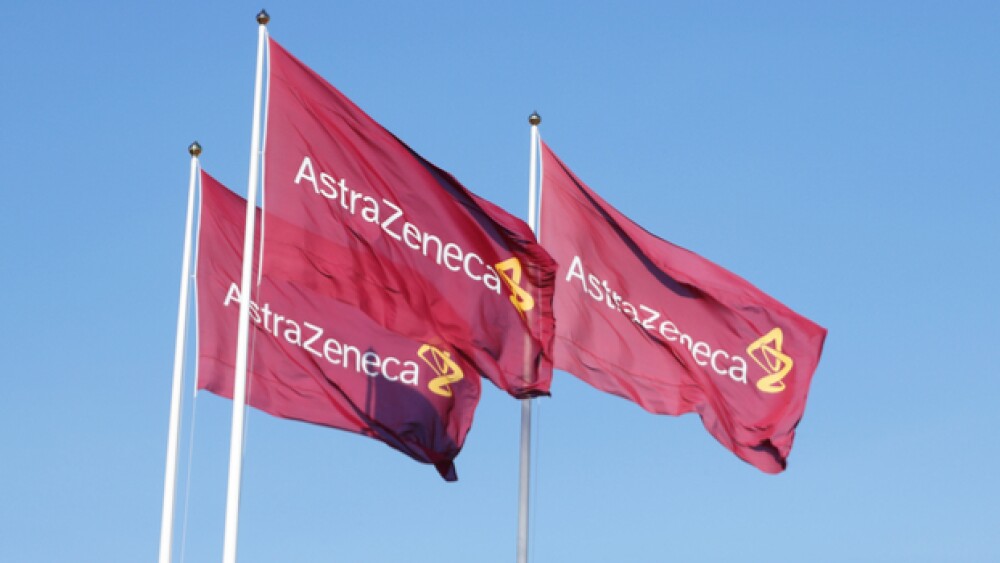AstraZeneca released new data that shows Calquence as a monotherapy and combined with Roche’s anti-CD20 drug Gazyva significantly improved progression-free survival in previously untreated CLL.
Roland Magnusson / Shutterstock
AstraZeneca has AbbVie and Johnson & Johnson’s Imbruvica squarely in its sights as its cancer drug Calquence continues to flex its muscle and meet the expectations of Chief Executive Officer Pascal Soriot who claimed two years ago that the drug would become a cornerstone of the company’s hematology pipeline.
Coming off the heels of approvals for Calquence (acalabrutinib) for chronic lymphocytic leukemia (CLL) and small lymphocytic lymphoma (SLL) last month, AstraZeneca released new data that shows Calquence as a monotherapy and combined with Roche’s anti-CD20 drug Gazyva (obinutuzumab), significantly improved progression-free survival (PFS) in previously untreated CLL. The data was from an interim analysis of the Phase III ELEVATE TN trial presented at the American Society of Hematology meeting in Orlando, Florida over the weekend. At a median follow-up of 28.3 months, AstraZeneca said Calquence in combination with Gazyva or as a monotherapy significantly reduced the risk of disease progression or death by 90% and 80% when compared to Gazyva plus the chemotherapy treatment chlorambucil.
Calquence is a Bruton tyrosine kinase (BTK) inhibitor. In B-cells, BTK signaling results in activation of pathways necessary for B-cell proliferation, trafficking, chemotaxis and adhesion. Last month it was approved by the U.S. Food and Drug Administration as a treatment for chronic CLL and SLL. Calquence was previously approved for the treatment of adults with relapsed or refractory mantle cell lymphoma (MCL). Earlier this year, AbbVie and J&J’s Imbruvica snagged its 10th approval since 2013. The FDA approved Imbruvica in combination with Gazyva for adults with untreated chronic lymphocytic leukemia/small lymphocytic lymphoma.
José Baselga, AstraZeneca’s head of oncology R&D, said the data from the ELEVATE TN trial provide further evidence that Calquence shows “remarkable efficacy and a favorable tolerability profile” as a new treatment option for CLL patients.
“These results also provide, for the first time, post-hoc analysis data exploring the potential progression-free survival benefit of adding obinutuzumab to a BTK inhibitor versus BTK inhibitor monotherapy in a randomized trial,” Baselga said in a statement.
AstraZeneca said the exploratory analysis showed treatment with Calquence, in combination or as a monotherapy, “demonstrated consistent PFS improvements across most pre-specified subgroups of patients with high-risk disease characteristics, including the unmutated immunoglobulin heavy-chain variable gene (IGHV), del(11q) and complex karyotype.”
The safety profile of Calquence remained consistent, the company added. Adverse events led to treatment discontinuation in 11.2% of patients treated with Calquence in combination with Gazyva, compared to 14.1% of patients treated with chlorambucil and Gazyva. As a monotherapy, 8.8% of patients discontinued use. With more than two years of data, AstraZeneca said 79% of patients remain on Calquence.
Jeff Sharman, the lead investigator of the ELEVATE TN trial and director of hematology research for The US Oncology Network, said the data from the trial showed Calquence demonstrated a clinically meaningful improvement in progression-free survival while maintaining its known tolerability and safety profile. Sharman said the results are encouraging for a patient population known to “face multiple comorbidities, and where tolerability is a critical factor in their treatment.”
Earlier this year, The ELEVATE-TN trial was halted in June after Calquence hit its endpoints following an interim analysis. Calquence combined with obinutuzumab and as monotherapy reduced the risk of disease progression or death by 90% and 80%. Calquence met primary endpoints in patients with previously-untreated CLL, which is the most common type of leukemia in adults. In May, AstraZeneca halted the ASCEND trial early after the medication its endpoint at an interim analysis. Similar to the ELEVATE-TN study, ASCEND data showed that Calquence hit the mark in progression-free survival in previously-treated CLL patients. The ASCEND trial marked the first time a Bruton tyrosine kinase (BTK) inhibitor showed a benefit in CLL as a monotherapy
Together, the trials showed that Calquence in combination with obinutuzumab or as a monotherapy significantly reduced the relative risk of disease progression or death versus the comparator arms in both 1st-line and relapsed or refractory CLL, AstraZeneca said.





